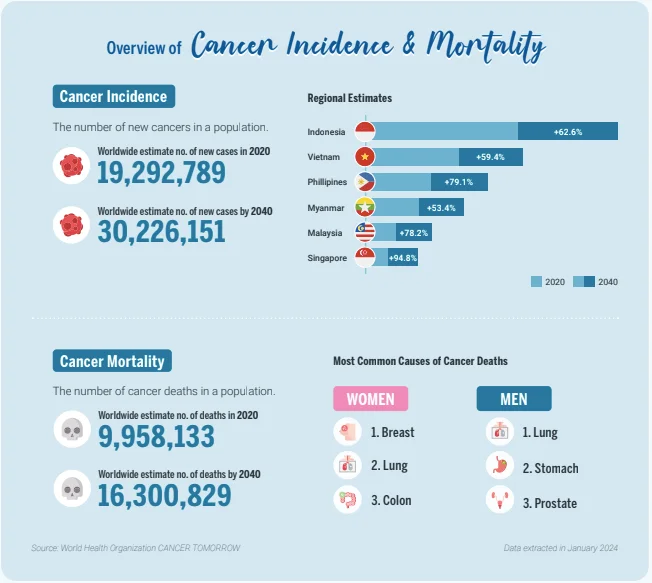News & Articles

World Health Organisation (WHO): Surviving Cancer Tomorrow

In 2018, World Health Organisation (WHO) launched CANCER TOMORROW, a tool that was created to predict the future cancer incidence and mortality burden worldwide from the current estimates in 2020 up until 2040.
Cancer is a leading cause of death worldwide, accounting for nearly 10 million deaths in 2020 alone1. The burden of cancer incidence and mortality is rapidly growing worldwide, with both ageing and growth of the population as contributing factors, in addition to changes in prevalence and distribution of the main risk factors of cancer2.
Estimating the future cancer burden is crucial both for health planning and the evaluation of interventions or changes in risk factors3. As such, WHO created CANCER TOMORROW using the GLOBOCAN database, which includes 185 countries and 36 cancers (as well as all cancers combined).
The data can be categorised according to age, sex, country, and cancer type to help users gain valuable insights into cancer trends, risk factors, and could even help one evaluate the effectiveness of prevention and treatment strategies. Users can also organise the data into tables, graphs, charts, and infographics to aid in visualisation.
It is important to note that such predictions of future cancer burden are inherently uncertain, and the extracted data must be interpreted with appropriate caution.
Nevertheless, such predictions can play a valuable role in healthcare planning, specifically in the allocation of resources. Additionally, they enable scientists to assess the potential impact of interventions designed to mitigate the effects of cancer.

Navigating cancer challenges with CANCER TOMORROW
In the face of the escalating global cancer burden, WHO’s CANCER TOMORROW has paved the way forward in navigating certain cancer challenges. This innovative tool forecasts cancer incidence and mortality up to 2040, enabling researchers to extract valuable insights into cancer trends, risk factors, and the effectiveness of preventive and treatment strategies.
With CANCER TOMORROW, we now have the option to extract valuable information from the tool and use it to raise awareness and spark conversations about the disease. Meanwhile, the trends and insights gathered can be shared with our patients to not only educate them, but also to give them confidence and hope.
Despite the inherent uncertainty of the future, these predictions will provide strategic resources that will significantly benefit our efforts to combat cancer.
| POSTED IN | Cancer Prevention |
| TAGS | cancer awareness, cancer survivorship, prevent cancer |
| PUBLISHED | 01 February 2024 |
